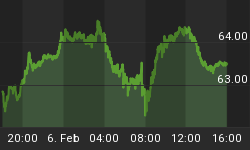Gold bugs around the world got a shock a few weeks ago when a tiny Canadian start-up called BitGold bought venerable GoldMoney, the second biggest (after BullionVault) precious metals storage firm.
Now come the questions. Is this a case of a flashy tech company using its temporarily-inflated stock to buy real assets, a kind of AOL/Time Warner deal which goes sour when the new tech turns out to be a bubble? Or are these the young visionaries who finally solve the puzzle that eluded their elders?
First, a little digression: Back in the late 1990s while writing mostly about the excesses of the dot.com bubble, I was looking for a more optimistic theme. After interviewing GoldMoney's James Turk for a couple of magazine articles, I fixated on his and others' attempts to use the Internet to turn gold back into a functioning currency. This was a libertarian fantasy made real, allowing people to keep their spare cash in sound money while bypassing the increasingly dysfunctional, predatory banks with their hidden fees and stupid rules.
Lots of magazine articles and book proposals followed, but despite gold's decade-long bull market, its digitization failed completely. eGold, the first mover, soon discovered that anonymity meant money laundering and was shut down by the police. GoldMoney required its users to disclose their identities, thus avoiding that legal minefield, but still ran up against regulations designed to limit the ability of alternative currencies to compete with central bank fiat. It eventually gave up, focusing instead on the boring but lucrative storage business.
Now, at the dawn of the age of cryptocurrencies, BitGold is reviving and updating the concept by storing bullion for customers and letting them spend their gold online or via debit cards. Among its cool new features is a tax calculator that figures users' capital gains/losses for the countries that tax gold as a commodity.
It's too soon to tell whether BitGold will succeed where its processors failed, but the early debate is, as you'd expect, lively. On the negative side, UK financial journalist (and author of a book on bitcoin) Dominic Frisby makes a cogent case for its probable failure. Here's an excerpt:
Don't touch this gold and bitcoin combo with a ten-foot bargepole
Last week, Canada saw the initial public offering (IPO) of BitGold.It opened with a lot of publicity and a bang.
Today we consider BitGold.
We don't ask whether you should run away - but how fast.
Bitcoin plus gold = sexy name, but not a lot of substance
BitGold is listed on the Venture Exchange in Canada with the rather handy ticker of XAU.V.
There are 36.6 million shares outstanding, of which 20 million are controlled by insiders. Based on Friday's close at C$4.14 per share, it has a market capitalisation of around C$161m.
It has C$9m cash and, with 6.4 million warrants (3.9 million exercisable at C$1.35), another potential C$5m in the pipeline. The marketing budget this year is C$5m.
Among its early investors are, notably, Soros Brothers Investments and Sprott Asset Management.
The idea is for the company to become a PayPal for gold. You can go into a coffee shop or a grocer's and buy everyday items with gold. You can also buy and store gold.
The company makes its money by charging 1% on transactions. For now, storage is free (although that is going to be an issue going forward - gold costs money to store).
As blogger Otto Rock notes, last year BitGold's founders were paid in shares worth 3.3c a piece. The seed placements and pre-IPO fund raisings were at 90c plus warrants. The stock went public at C$2.70. After hitting C$4.50 on Thursday, the stock closed the week at C$4.14. Almost 701,000 shares traded on Friday.
Some people have done very well out of this already. But the business has hardly got going yet. It has very little market share, let alone profit. As someone who's seen what Vancouver is capable of, this has set all my alarm bells off.
There's been a lot of hype and now somebody is selling. There's an expression for that. Can't for the life of me remember what it is.
Frisby goes on to point out that there's nothing preventing regulators from strangling this newborn in its crib as they did with GoldMoney and eGold, and that the concept of digital gold is inherently flawed because anyone with both fiat currency and gold would logically save the gold and spend the fiat.
These are good points. The regulators now gearing up to counter bitcoin can easily adapt to digital gold. But the idea that no one will want to spend gold is debatable. A checking account requires currency to be on deposit, where it can depreciate before being spent. Better to have that cash sitting in an asset like gold that will appreciate over time. Presented this way, a digital gold account might be an attractive combined savings/checking account for people who understand money.
And the upside of a functioning digital gold currency might be spectacular: If gold begins to flow into such accounts, the added buying pressure would send the price higher, which would make it even more attractive relative to fiat currency, leading to more buying, etc. The resulting feedback loop would be fun to watch.
So the prudent approach to BitGold is the same as for bitcoin: Acknowledge that the idea has promise, sample it if you're so inclined, but don't trust it with large amounts of capital until it's been tested by regulators, the markets, and time.















